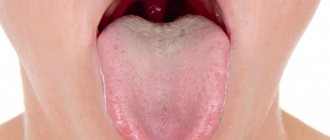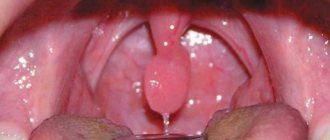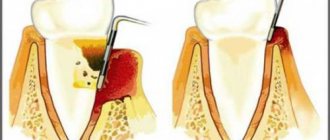The tongue in the throat is a small process that in its natural state is not felt at all. The situation when the tongue in the throat is swollen takes on completely different symptoms. The person feels discomfort and severe pain.
Swelling of the tongue in the throat (pathology uvulitis) is a clear symptom of infectious diseases, burns, injuries and even oncological processes in the body. It is very important to determine the cause of uvulitis as soon as possible. Delay stimulates the development of severe complications that pose a serious danger to human life.
Content:
- Liver
- Stomach
- Heart
- The immune system
- Nervous system
- Alcoholic delirium is a dangerous symptom complex after binge drinking
After taking a large dose of alcohol, the condition always worsens.
The next day the person feels exhausted, lethargic, suffers from severe headaches and muscle weakness. But in the absence of alcohol dependence (subject to one-time use of alcohol), negative symptoms usually go away quite quickly - within 24 hours. Symptoms after a long binge are always more painful. It's difficult to get rid of them. This is because severe ethanol intoxication develops. To eliminate it, it is necessary to conduct complex detoxification therapy in an inpatient drug treatment clinic.
When talking about the symptoms that plague addicts after binge drinking, narcologists always focus on changes in the functioning of internal organs. Particular attention is paid to malfunctions:
- liver;
- stomach;
- immune system;
- central nervous system.
How long do alcoholics live?
The life expectancy of those who suffer from alcoholism is significantly reduced. 20% of patients live more than 50 years. Acute heart failure often causes early death in drunkards under 40 years of age. A dangerous habit is fraught with a significant deterioration in quality and a decrease in life expectancy. The risk of leaving this world prematurely increases. There is no clear answer to the question of how long alcoholics live. Much depends on the age at which a person developed a harmful addiction, whether there are associated problems, etc. That is, the life expectancy of a drinker is determined by the strength of the body. Sudden deaths before age 30 are common. The average life expectancy is 48-55 years. However, this is under fortunate circumstances. 25% of addicted people do not live to reach the specified age mark.
Only by stopping drinking in a timely manner does a person suffering from an illness get a chance to prolong their life. However, in many cases, medical assistance cannot be avoided. Then a person will be able to cope with addiction and get rid of addiction.
Liver
Many symptoms after heavy drinking are associated specifically with liver damage. Alcohol has a toxic effect on the organ, as a result of which individual tissues begin to die. In advanced cases, cirrhosis and hepatitis develop.
that the liver is not in order :
- pain in the right hypochondrium;
- bitter taste in the mouth (more often appears in the morning on an empty stomach);
- the appearance of a jaundiced skin tone;
- bloating;
- nausea (worsens after eating fatty foods).
If, along with the standard symptoms of a hangover after binge drinking, signs of liver pathology appear, you should consult a doctor as soon as possible. Delay is fraught with dangerous complications.
Treatment of a swollen tongue in the throat
Inflammation of the tongue in the throat is a rather unpleasant symptom that can be a sign of various diseases. The tongue is located at the back of the soft palate. In its normal state it is small and its presence is usually not felt.
The inflammatory process associated with the expansion of the tongue and its swelling is called uvulitis. This is a rather unpleasant symptom, which is also life-threatening if not treated promptly.
- Feeling of a foreign body in the throat;
- Nausea, vomiting;
- Problems with swallowing food;
- Hoarseness,
- Language problems;
- Difficulty breathing;
- Increased salivation.
The problem usually occurs in the morning, right after sleep, so it can cause serious anxiety, which only worsens the patient's condition.
If you experience the symptoms described above, you should carefully examine your mouth and throat. If the tongue is grown, swollen, red or cyanotic, then it is very likely that uvulitis is present in the nasopharynx.
Causes
There are many reasons why a tongue can grow. The cause may be an unpleasant symptom:
- inflammatory processes caused by viral or bacterial infections;
- allergies;
- injuries;
- chemicals;
- thermal factors;
- tumors localized in the nasopharynx.
Viral or bacterial infections are rarely accompanied by inflammatory reactions, which can enlarge the tongue. This most often occurs when the inflammatory area is located close to the roof of the mouth and the swelling affects the adjacent soft tissue.
The high pathogenicity of bacteria that cause pathology and significantly reduce the body's protective functions can lead to the inflammatory process in the throat affecting the tongue. Possible increase in size and swelling of the tongue:
- Inflammatory gland infections;
- Inflammatory processes in the nasopharynx, for example, rhinitis, pharyngitis, adenoiditis;
- Throat abscess;
- Purulent inflammatory processes in the mouth, gums and teeth, for example. dentistry, gingivitis, periodontal diseases;
- infectious diseases such as diphtheria and mononucleosis, which cause inflammation of the soft tissues of the neck, enlarged lymph nodes, and plaque on the tonsils;
- inflammatory processes of the salivary glands;
- various diseases such as syphilis and tuberculosis
Important! If swelling of the tongue is caused by the above reasons, then the unpleasant symptom is usually preceded by clinical manifestations characteristic of the underlying infection.
In this case, the patient complains of painful swallowing, tightness in the throat and difficulty breathing.
Often the cause of inflammation of the tongue in the throat is cancer. Cancer and other types of benign and malignant neoplasms can affect the surface of the mucous membranes of the throat and mouth.
Considering the statistics, tongue cancer pathologies account for about one and a half percent of the total number of nasopharyngeal cancers, while swelling of the soft palate can also occur in tumors of surrounding organs and tissues.
Exposure to high or too low temperatures can lead to burns of the mucous membrane of the nasopharynx and cause inflammation of the tongue. Inhalation of vapors from various chemicals can also cause damage to the nasopharyngeal organs.
Hot food and drinks, strong alcohol are irritants in this situation.
Damage to the mucous membrane occurs not only as a result of direct burns, but also as a result of excessive dryness in the oral cavity.
Important! Accidental use of acetic acid, various chemical essences and rinsing with a highly concentrated soda solution can lead to tongue burns.
In case of allergies, the tongue in the throat often becomes enlarged and swollen. Allergies can be caused not only by food, but also by household chemicals, pollen and wool.
The fact that swelling of the tongue is caused by allergies should be taken into account by people prone to allergic reactions. In this case, an enlargement of the palate may be accompanied by urticaria, allergic dermatitis, and swollen angioedema.
In such a situation, symptoms develop quickly, swelling occurs against a satisfactory background of health.
Inflammation of the tongue can also occur as a complication after taking medications. In this case, allergic inflammation of the tongue is often accompanied by itching, rashes, swelling of various parts of the body and difficulty breathing. The reaction usually occurs as a result of topical application of a particular drug or injection of a drug.
Swelling of the tongue can also occur as a reaction to chemotherapy during cancer treatment.
The palate consists of a large number of small blood vessels, so inflammation develops quickly and causes significant swelling.
- damage to soft tissues from hard food;
- constant vomiting, especially in situations where it is caused artificially;
- damage to the tongue during medical procedures such as throat scans, dental examinations;
- snoring, which can cause swelling due to air vibrations;
- excessive craving for cigarettes, hookah;
- hereditary diseases such as angioedema.
Diagnostic features
In the case of inflammation of the tongue, the diagnostic procedure is usually simple. A specialist can determine the cause of an unpleasant symptom by analyzing only the patient’s symptoms and conducting an examination. If the diagnosis requires clarification, additional procedures are used.
- General blood analysis. This procedure helps determine the nature of the disease, excluding or confirming the presence of infection. For example, an infectious disease increases the number of white blood cells, while the allergic nature of the symptom increases the number of eosinophils in the blood.
- Culture of bacteria to determine the microflora that caused inflammation of the tongue will help determine the type of pathogen and its susceptibility to basic antibiotics.
- If your doctor suspects an allergic reaction, an immunogram or allergy diagnostic test may be needed.
- To rule out cancer, the doctor may order a histological examination of the tongue tissue, x-rays or tomography.
Important! If the tongue is very enlarged and prevents full breathing, you should immediately seek medical help from specialists.
Stomach
If you abuse alcohol, gastric pathologies will occur. They are characterized by:
- nausea;
- heartburn;
- rapid weight loss;
- frequent belching;
- constipation alternating with diarrhea;
- pain in the epigastric region;
- repeated vomiting.
Dangerous complications of prolonged binge drinking are pancreatitis, inflammation of the pancreas. Such problems have specific symptoms:
- pain under the ribs;
- inability to reduce discomfort by changing body position;
- vomiting immediately after eating food or taking medications.
The pancreas needs to be treated urgently. Otherwise, its necrosis may develop, which will lead to death.
What consequences can surgery have without preliminary research?
Without an accurate diagnosis, surgery can have an unpredictable outcome. That is why a good otolaryngologist will definitely prescribe additional tests, for example, sleep endoscopy and polysomnography. If this stage is skipped, several scenarios for the development of postoperative events are possible.
- Getting rid of snoring or significantly reducing its intensity . This is exactly what everyone hopes for when they go under the knife. However, only a few get what they want. At the same time, it will not even be possible to immediately assess the effect of surgical intervention. It will appear only after a few weeks, when the postoperative swelling has completely subsided.
- Lack of positive dynamics in snoring or minor improvements . Pathologies of the ENT organs may not be the only or even the main cause of snoring or apnea. Therefore, the operation will not affect the situation in any way. Moreover, even after an unsuccessful attempt, you will have to go through a difficult postoperative period, endure pain when swallowing, discomfort during speech, and increased salivation. You may also experience other side effects, such as nasal voice, reflux of food into the nasal cavity, etc.
- Worsening snoring and apnea . Operations during which part of the tissue is removed are associated with the formation of scars. And some manipulations are specifically aimed at tightening the soft palate in order to reduce its mobility. At the same time, scar tissue also narrows the respiratory lumen. And it is not always possible to predict whether this will cause even more intense snoring and even more frequent episodes of apnea than the pathology of the ENT organ itself.
Let us repeat once again that half the success of ENT surgery to get rid of snoring is careful selection of patients. Moreover, in most cases, a delicate night problem can be solved by other – non-invasive – methods.
Heart
Jumps in blood pressure, pain in the left chest, difficulty breathing - all these are symptoms after binge drinking, indicating disturbances in the functioning of the heart. Ethanol and its toxic metabolites destroy the myocardium, promote vascular stretching, and trigger reactions that provoke fibrosis.
In heavy drinkers, the veins become very fragile and easily damaged. The blood thickens, causing red blood cells to stick together. Then blood clots form. All this leads to:
- Arrhythmias, tachycardia. Heart beats too fast. An alcohol addict feels a pulsation in his temples and weakness. He may lose consciousness.
- Ischemic disease. When blood flow in the coronary arteries is disrupted and when they spasm, the death of individual zones of the myocardium occurs. Then the addict complains of pain behind the sternum, which radiates to the left shoulder blade or arm.
- Cardiomyopathies. An insidious condition that contributes to heart failure. Its appearance is indicated by swelling in the face, legs, and difficulty breathing.
- Arterial hypertension. Vascular spasms, blood clots, thickened blood - all these are prerequisites for arterial hypertension. Very often, after a binge, blood pressure rises sharply. It's hard to knock him down. It can reach a hypertensive crisis.
Any heart problems should be treated under the supervision of a doctor. Carrying out self-therapy, an alcoholic risks dying.
The effect of daily alcohol consumption on the body
Alcohol-containing products tend to cause cravings, which are very difficult to overcome in the future. The composition contains many harmful impurities that have a detrimental effect on the entire body. Gradually, tissues and cells of almost all systems are destroyed.
Ethyl alcohol, when used systematically, causes both physiological and social damage. The consequences manifest themselves in the form of serious damage to all body systems and the development of chronic diseases.
Physiological changes
When ethanol gets inside, it interacts with nervous tissue: its protection is destroyed. Just 1 liter of beer or a bottle of wine leads to serious consequences - the death of up to 10 thousand brain cells that cannot be restored. This subsequently affects mental activity and general health.
Ethyl alcohol also disrupts the conduction of impulses through nerve cells. For the central nervous system this manifests itself as:
- problems in the emotional sphere;
- the appearance of speech defects;
- disturbances in the functioning of the organs of vision and hearing;
- problems with coordination, etc.
Alcohol has an effect on the cardiovascular system. The tissues of organs are connective tissue, the elasticity of which is lower. This affects the functioning of the heart and blood vessels: problems with blood pressure appear, and there is a violation of the contractile function of the myocardium.
The whole body suffers, there are no exceptions. Ethyl alcohol harms the walls of the stomach, so the risk of ulcer formation is high. There is a change in acidity, which also negatively affects the digestion process.
Frequent dizziness and headaches are also a common consequence of alcoholism.
External signs of a drinking person
The visual manifestations of a drunkard do not immediately become noticeable. Signs begin to develop gradually. With each subsequent stage of development of the disease, the marks on the face of an alcoholic become more and more pronounced. Most of them are reflected in appearance:
- due to improper outflow of bile, the whites of the eyes and skin become yellow;
- the face turns red as blood pressure rapidly rises after drinking alcohol;
- the skin becomes covered with pimples and rashes;
- The area under the eyes suffers - so-called bags are formed, spoiling the appearance.
Dry epidermis and accelerated appearance of wrinkles are also signs of people who drink. Often the face is covered with a thin vascular network.
The nose takes on a burgundy-red hue. Much changes in facial expressions: the muscles of the mouth relax excessively, the forehead tenses. As a result: the face takes on a rather strange expression, as if always slightly surprised.
People who drink lose weight and their skin looks unhealthy. In this case, swelling of the face is characteristic. These are the signs that will help you recognize a drunkard at first sight.
Mental changes
Long-term use of ethanol-containing drinks is fraught with significant mental disorders. There is a high risk of developing alcoholic hallucinosis. Often patients hear voices that insult them, say unpleasant things, and are often threatening in nature.
The most common disorder is delirium, otherwise known as delirium tremens. With hallucinosis there is no impairment of consciousness. The patient continues to navigate in time. In some patients, the disease becomes chronic.
Personality degradation is a fairly common accompaniment of addiction. Intellectual abilities and stress resistance are significantly reduced. The drinker is secretive and taciturn. An ever-increasing dose of alcohol negatively affects the ability to adequately perceive reality. In the morning, the patient does not remember what happened the day before while he was aggressive or unconscious.
Impact on family relationships
An alcohol abuser destroys both his life and his family. Alcoholism is not compatible with family life. For the patient, the environment becomes an obstacle on the path to addiction. The social role of a person is changing dramatically, as is psychology. Close people suffer, as the person becomes weak-willed and aggressive. The wife of an alcoholic and his children have to endure a lot. The drinker stops fulfilling his family responsibilities and brings a lot of trouble to his loved ones. Inappropriate actions, changeability in mood, hostility - this does not have the best effect on relationships between people. The rudeness and irritability of an alcoholic primarily affects those closest to him - his wife and children. The progression of the disease further complicates the situation. This often leads to discord within the family and subsequent divorce.
The well-being of children is at risk. They grow up in an unhealthy environment, which affects their psyche. All the patient's immediate circle suffers from binge drinking. Female alcoholism is no less dangerous. A sick woman is not able to fully perform the functions of a mother. The disease destroys women's nature. Long-term alcohol abuse is fraught with serious changes in the psyche. This is especially dangerous for children and their health.
Psychosis and hysteria become constant companions of an alcoholic. Another problem is codependency. The suffering felt by family members is a direct consequence of the drinker’s actions. The well-being of others deteriorates in proportion to the increase in the dose consumed by the patient. Everyone is stressed: spouse, children.
The immune system
Symptoms after binge drinking associated with decreased immune defense are:
- weakness, insomnia, inability to focus on anything;
- exacerbation of existing chronic diseases;
- development of acute pathologies;
- pale skin;
- hair loss;
- decreased appetite.
The immune system fails after heavy drinking, as the body cannot function normally under conditions of constant ethanol attack. The situation is aggravated by poor nutrition - during drinking sessions, alcoholics eat anything.
Nervous system
The central nervous system is depleted under the influence of high doses of alcohol. Then an alcohol addict trying to break his binge is faced with:
- insomnia, too light sleep;
- mood swings;
- uncontrolled aggression;
- inability to adequately perceive what is happening around;
- apathy;
- depression;
- visual, auditory and tactile hallucinations;
- memory loss;
- epileptic seizures;
- delusional;
- panic attacks.
Often, binge alcoholics behave in ways that pose a threat to others. They see their relatives as monsters who need to be killed, and they make attempts to do so. It is important not to treat mental disorders at home - this is impossible. The first thing to do is call a drug treatment ambulance, which will take the patient to the hospital.
Alcoholic delirium is a dangerous symptom complex after binge drinking
Drinking alcohol for a long time and never experiencing delirium tremens is impossible. Sooner or later, any addict experiences all the horrors of this condition. You can recognize it by its symptoms:
- increasing level of anxiety;
- increased sweating;
- severe weakness;
- increased body temperature;
- blood pressure surges;
- tachycardia;
- involuntary trembling of the limbs.
A little later, hallucinations begin. A person cannot calm down or fall asleep. Due to strong excitement and uncontrollable actions, it becomes dangerous for those nearby.
Narcologists know of many cases where addicts, being in a state of “delirium tremens,” killed, robbed, attacked random passers-by, and attempted suicide. Delirium after binge drinking requires competent drug treatment and psychiatric treatment.
Binge drinking is a very big burden on the body. Even young and healthy people who abuse alcohol quickly turn into mentally ill and disabled people. Don't bring yourself to this state. If the craving for drinking has become irresistible, go through coding. Save your life!
Literature:
- Alcoholism / Donald W. Goodwin; [Transl. from English B. Pinsker]. - M.: Olimp-business, 2002. - XII, 224 p.;
- Endogenous intoxication syndrome (manual) / S. G. Musselius. — Ed. 2nd, revised and additional - Moscow: Author's book, 2019. - 356 p.
- Chronic alcohol intoxication / A. Ya. Grinenko et al. - St. Petersburg: R. Aslanov Publishing House: Legal Center Press, 2007. - 537 p.
- Mental illnesses: clinic, treatment, prevention: [Ref. a manual for neurologists, psychotherapists and doctors of other specialties] / Tyuvina N. A. - M.: Publishing house. house "KRON-press", 1997. - 250 p.











